Food waste. An enormous problem. Approximately one-third of all the food humans produce gets wasted and remains uneaten.
Food waste is a major part of the impact of agriculture on climate change. In order to grow food, we cut down forests, we use fossil fuel to run farm equipment, produce nitrogen fertilizer, and distribute food to consumers. Moreover, when organic waste is not handled properly (through composting), it produces methane, a greenhouse gas, from anaerobic digestion of organic matter in a landfill. Also, non reclaimed phosphorus in food waste leads to further phosphate mining, which is a finite natural resource.
On one hand, humanity wastes a lot of food that we produce. Meanwhile, millions of impoverished people experience hunger and malnutrition.
Here’s an example:
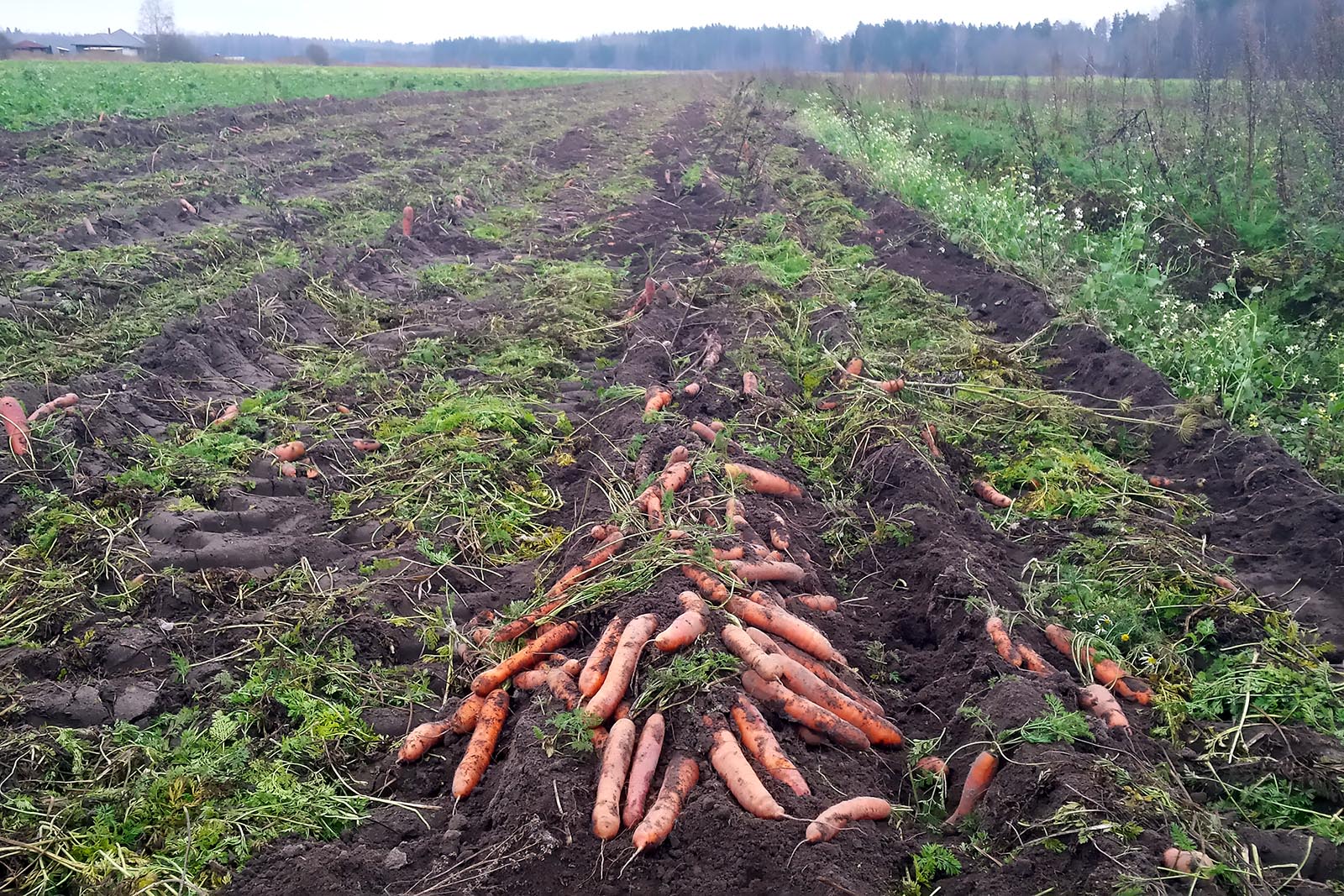
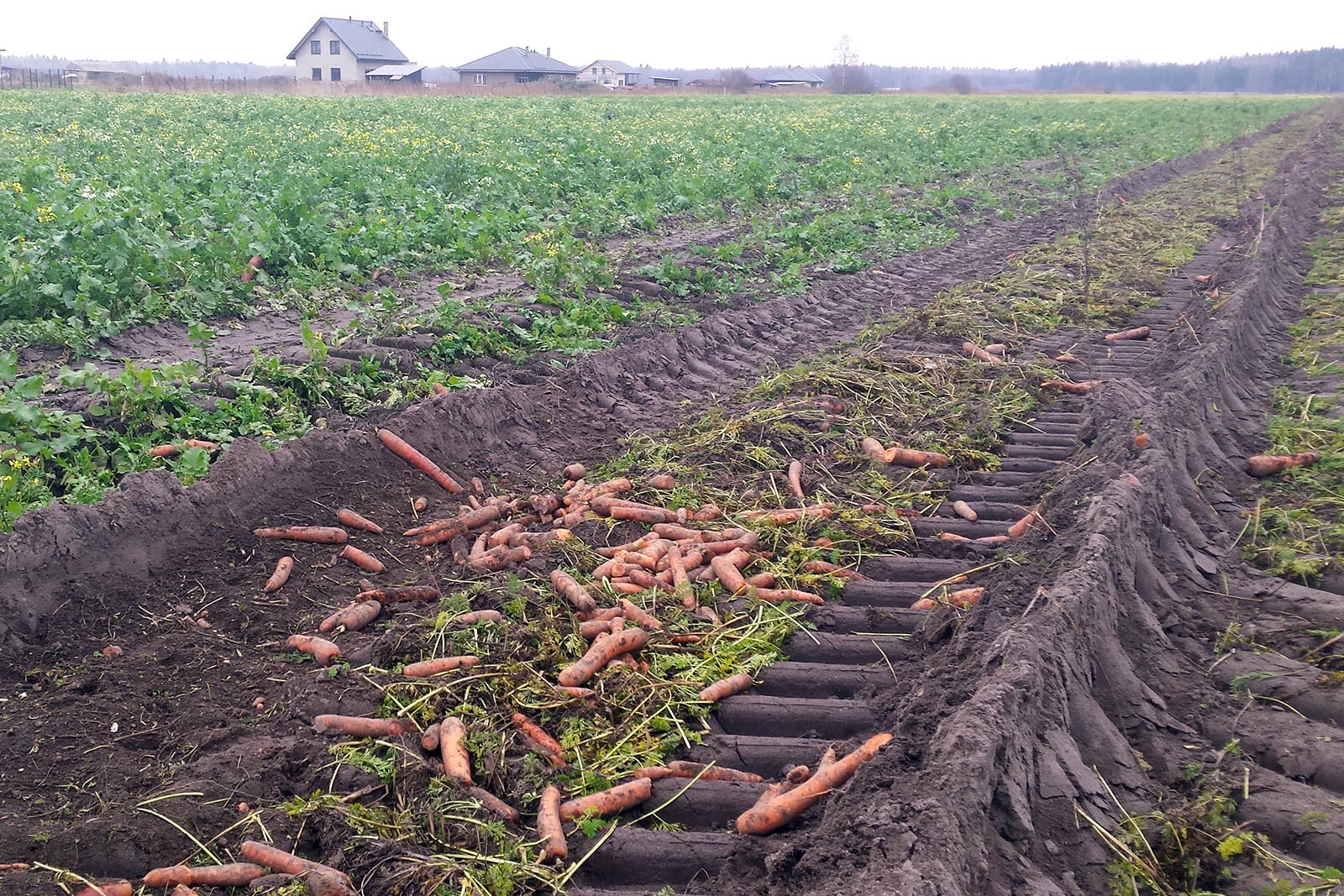
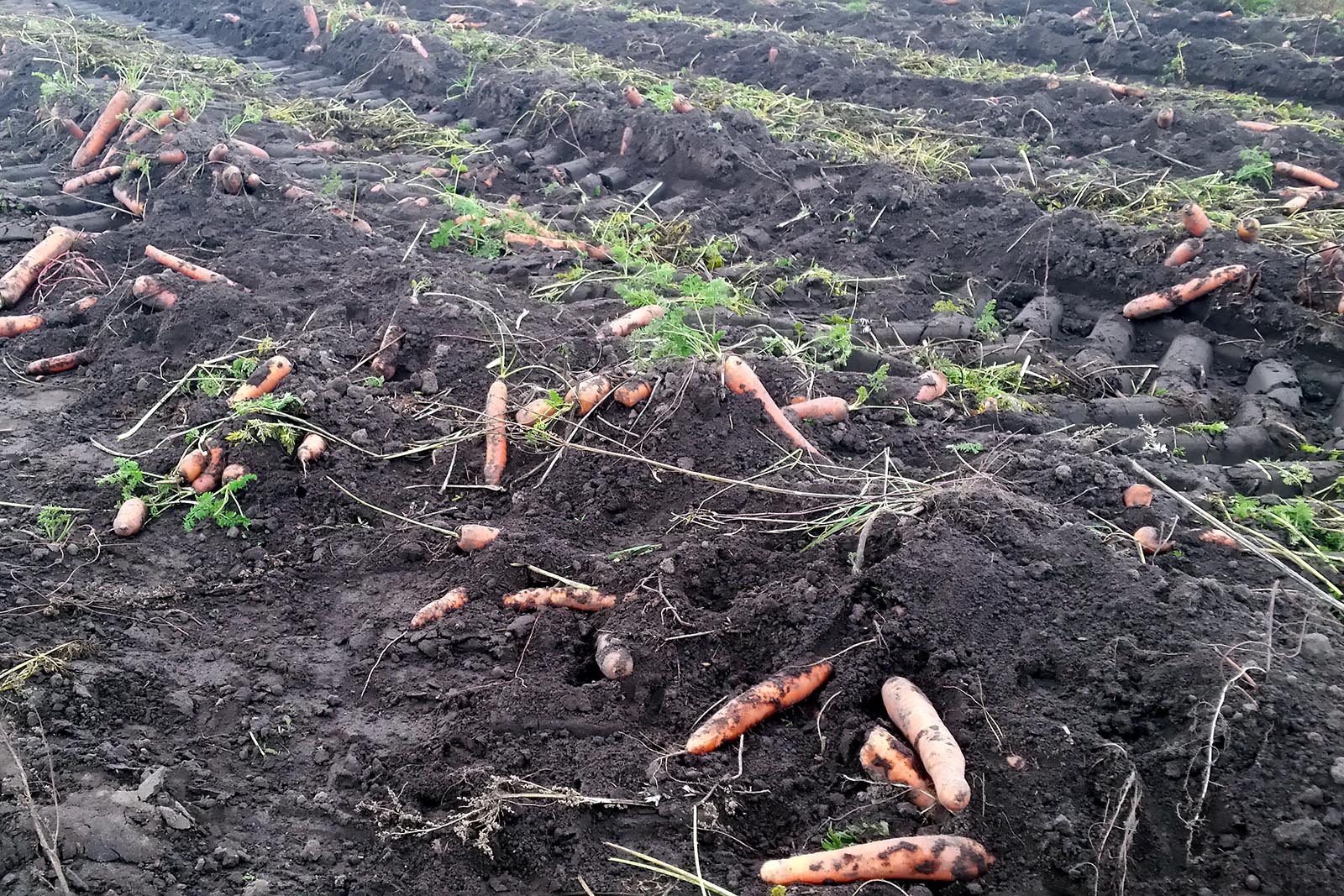
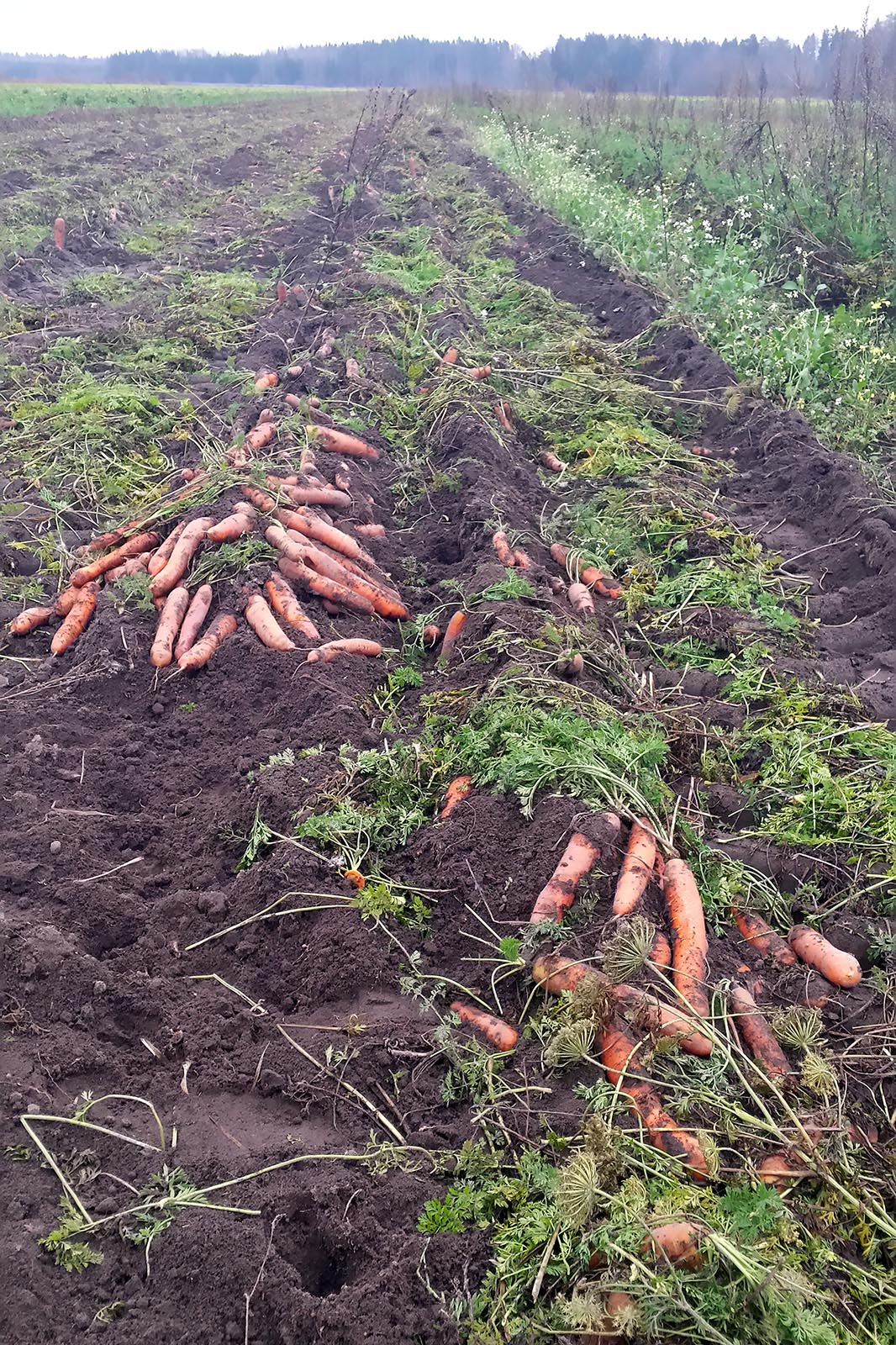
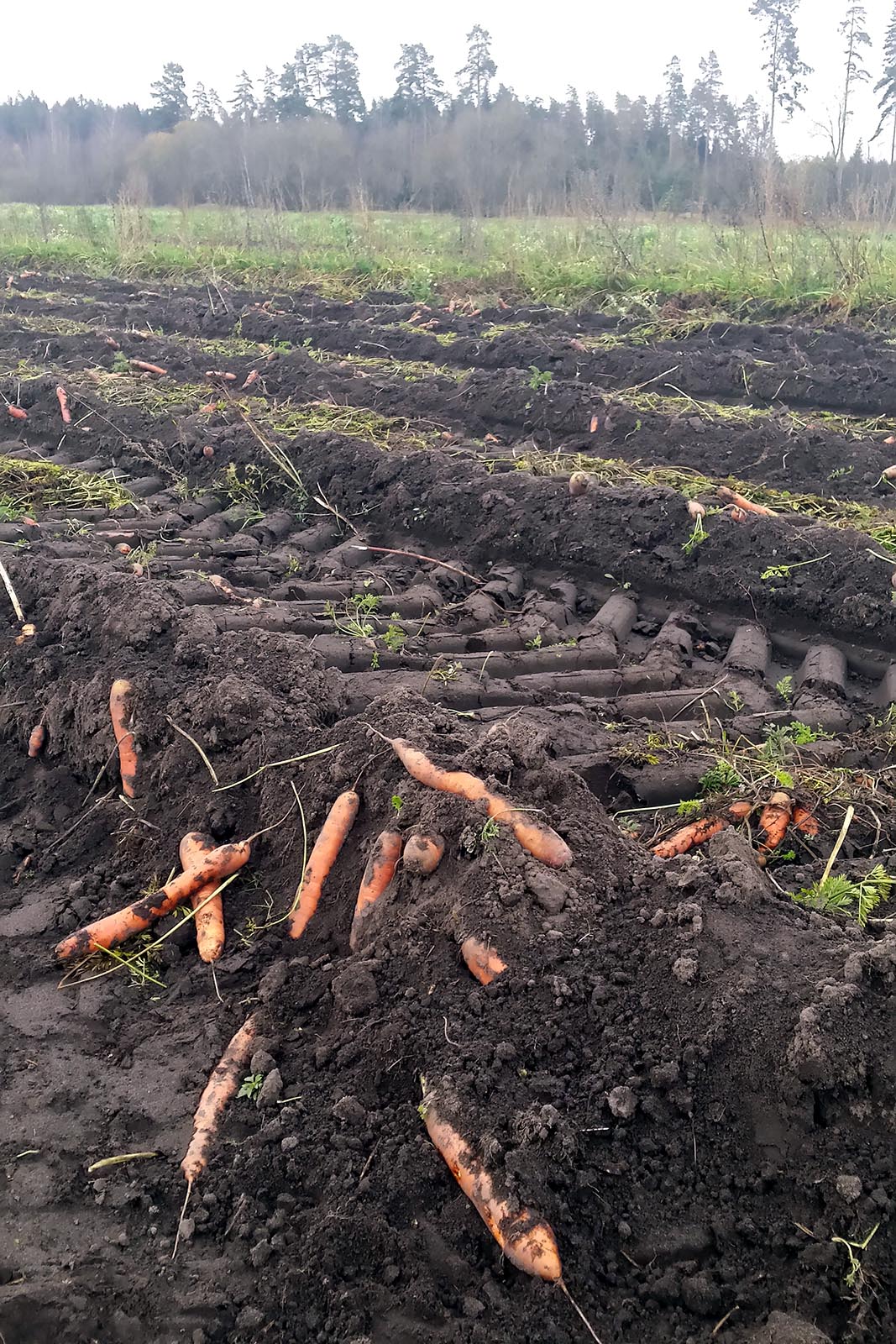
This is a carrot field in a cycling distance from my boyfriend’s home. After mechanical harvest, owners of this carrot field have left a large amount of carrots to just decompose. Apparently, hiring a worker who would manually pick these carrots is not cost effective for the farmer who owns this field. Leaving some carrots to rot is cheaper.
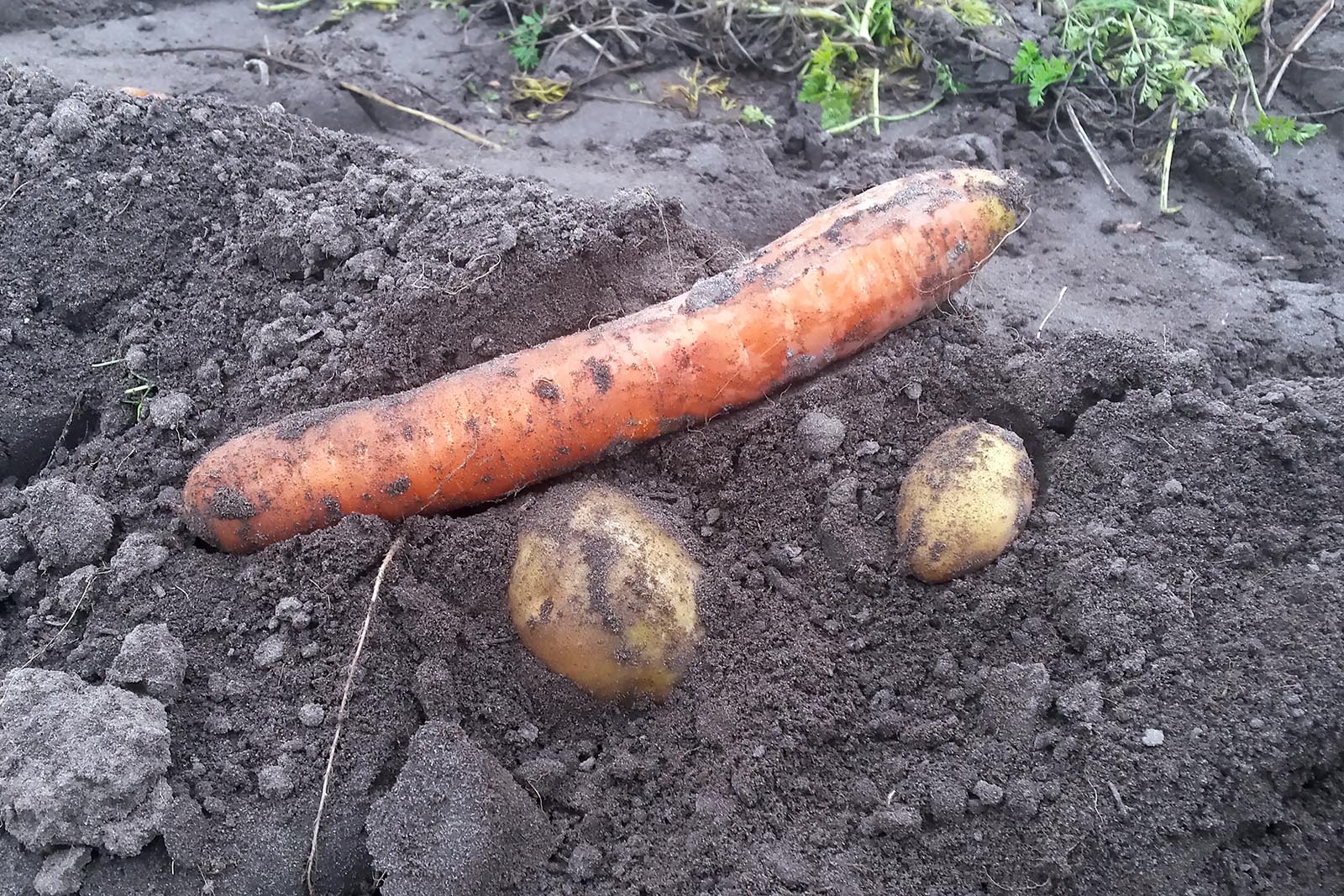
In this field there were not only carrots but also a few potatoes scattered here and there. My guess is that potatoes were grown in this field the previous year.
Over the last week, I and my boyfriend stole about 15 kilograms of potatoes and 60 kilograms of carrots from this field. I say “stole,” because technically these carrots and this patch of land do have an owner. Granted, locals have been gathering leftover vegetables in these fields for years, and it appears that the owner doesn’t mind people collecting leftover vegetables after the mechanical harvest is finished.
The owner of this field sells carrots for wholesale prices, and those, just like workers’ salaries, are subject to taxes. Meanwhile, I and my boyfriend think about carrot value in terms of retail prices, and we don’t have to pay taxes on the carrots we collect ourselves, thus gathering these carrots is financially beneficial for us. If a person spends 40 minutes cycling and gathering 15 kilograms of carrots, then their value in retail prices is higher than what the average worker earns in 40 minutes at work after taxes.
Still, gathering carrots from this field is financially beneficial only for the locals who live nearby and who don’t earn large salaries. In order to get to this field from my city, I have to pay 2.70 euros for train tickets. Moreover, this field is in a cycling distance from my boyfriend’s home (he lives close to a train station), but this field is not in a walking distance from the train station. If I wasn’t already visiting my boyfriend and couldn’t borrow his brother’s bicycle, I wouldn’t be collecting carrots in this field.
Thus, even if a person is poor and has some free time, gathering free food might be not cost-effective for them. If you have to pay for train tickets and can carry no more than 10 kilograms of vegetables in your hands, it’s just not worth it.
Of course, the math changes once you own a car. Then you can gather maybe 200 kilograms of carrots to last the entire family and all your friends and neighbors for a few months. Getting to the field with a car is also much faster than walking or cycling. (I don’t even have a driver’s license, never mind a car. Most of the time I don’t need a car, but occasionally I run into situations where having one would be really convenient.)
So here we have it: a planet on which millions of people experience food insecurity or even outright hunger and food rotting in farm fields. Isn’t capitalism amazing? After all, letting food rot in a field is cheaper than collecting it and distributing it to hungry people for free. Sometimes letting it rot is even cheaper than selling it to somebody who would eat it.
Food gets wasted throughout the entire food system (production, processing, distribution, retail, consumption), and often it happens for financial reasons.
Grocery stores routinely order more food than they can sell, because fully stocked shelves are supposed to look pretty and entice shoppers to buy more.
Grocery stores throw out still edible food that is about to pass its “sell-by” date, because if they gave this food away to people for free/with a significant discount, the same people wouldn’t buy other food items for the full price.
Sellers often refuse to sell “ugly” produce with a discount, because a buyer who already bought a kilogram of “ugly” fruits or vegetables won’t buy another kilogram for the full price.
So it goes.
Often enough providing food for the hungry simply isn’t profitable.
This reminds me vegan/vegetarian arguments about how farm animals eat the same grains, vegetables, and legumes that humans could eat directly instead. Thus reducing humanity’s overall meat consumption would also reduce hunger. Given how much food waste humans already produce and how it’s not profitable to feed the hungry, I have my doubts about this argument.
But still, the entire humanity’s food supply is indeed interconnected. An increased demand for some food item in one wealthy country means that it will cost more also everywhere else on the planet, which means that poorer people can become unable to afford said food. After all, historically, during most famines food was still exported from that region in which people were literally starving to death.
Food production causes immense greenhouse gas emissions. Thus humanity should stop producing more food than we can eat. Meanwhile, we also should ensure than every person on this planet gets adequate nutrition. Capitalism doesn’t help solving either of these problems.

In Canada and Taiwan, I’ve been to “pick your own” farms where (rather than harvesters) people can pick fresh off the vine or out the dirt and pay by weight. There’s much less waste, but it requires the farms be accessible. I can ride by bike in Taiwan, but in Canada (and probably the US) you’d need a car both for distance and for weight.
I think a fair punishment for the crime of food waste would be to be locked up, without food, for as long as the food you threw away could have fed you for.
The more things change – or don’t.
Steinbeck’s Grapes of Wrath has some powerful true scenes on this from back in the era of Hovervilles and the Dust Bowl if I recall right… (Read years ago. Powerful novel. Understatement.)
bluerizlagirl @#2
But is that really fair? At least in Latvia, most farmers earn little money. Here producing food is a bad career choice if you want to become wealthy. Collecting all the carrots from a field manually costs more money than collecting them mechanically and leaving some of the carrots to rot on the field. My guess is that at least some farmers don’t have any spare extra income they could spend on making sure that everything that’s edible in their fields truly gets manually harvested.
Often the problem is with how our capitalist society is organized and what choices it offers individual people in the first place.
That being said, there certainly are plenty of cases where food gets wasted intentionally and individuals responsible could have made better choices. In such cases I am fine with blaming an individual person who decided to waste food.
From a human perspective, food gets wasted. From a biosphere perspective, food gets recycled. If you can remove the fossil fuel usage from the production and transport cycle (electric tractors etc) it becomes less of a problem.
Lofty @#5
In order to grow food, humans chop down forests (deforestation exacerbating global warming) and destroy natural habitats for wild plants and animals. Instead of producing more food than we can consume, humans ought to use said patch of land to plant forests. Or, at the very least, we ought to stop cutting down forests and turning that land into more farm fields.
I’ll be much happier when agriculture moves indoors using only renewable energy. Keep out pests, use marginal land instead of prime habitat, go vertical instead of horizontal. One early example:
https://www.sundropfarms.com/
In the UK the big supermarkets now sell ‘wonky’ fruit and veg so you can choose between them and ‘perfect’ fruit and veg. When available I always buy the wonky ones, they are cheaper and the definition of ‘wonky’ doesn’t mean there is anything wrong with them. In fact in the case of the last bag of six avocados I bought for £1 the only thing ‘wrong’ with them seemed to be that they were all larger than the usual size that store sells, not exactly a problem. There are also organisations that take food from the supermarkets that is at it’s ‘use-by’ date and distribute it to places that can use it like foodbanks, domestic violence refuges etc. Although in the UK all the supermarkets along with smaller shops do mark down food that is at the use-by date too. It is by no means perfect, but there has been a lot of work gone into reducing food waste here, still a long way to go, but the effort is being made. However the fundamental problem that food is too cheap isn’t being worked on anywhere near as much and until that happens I don’t think there wil be adequate change.
See also :